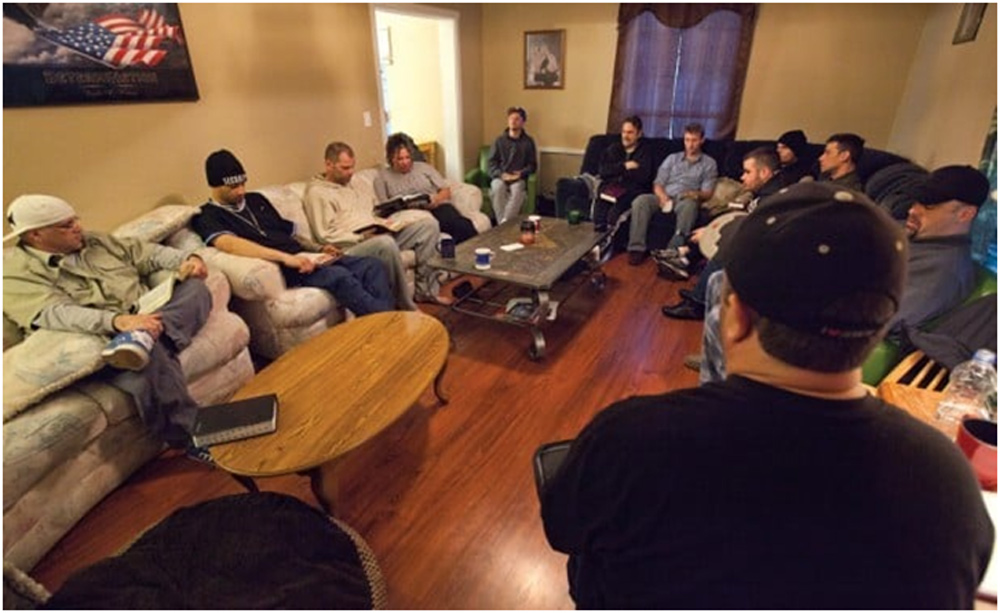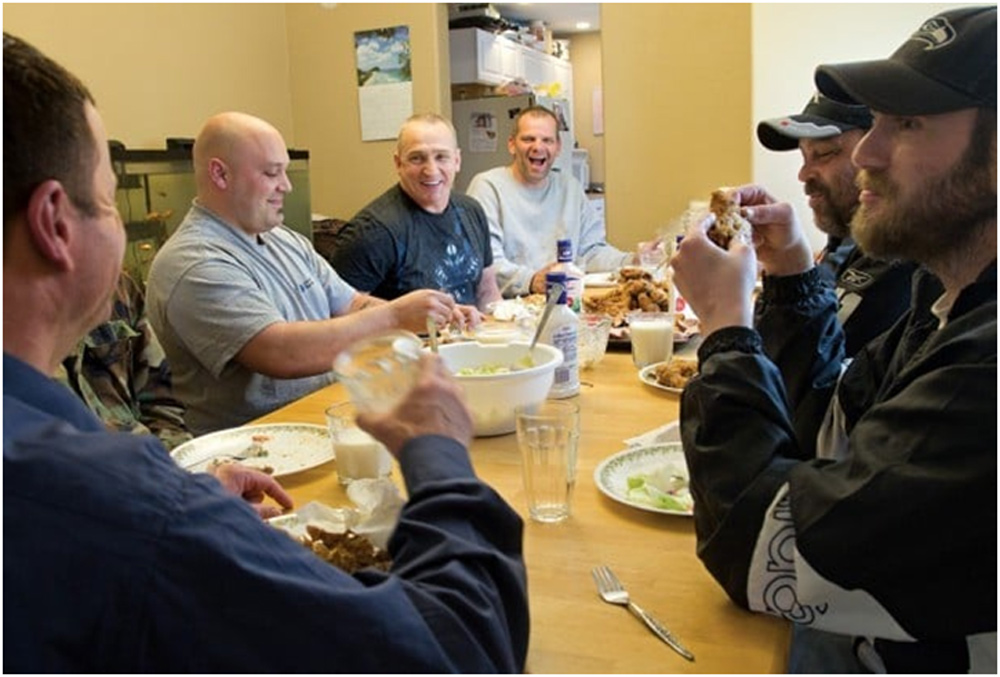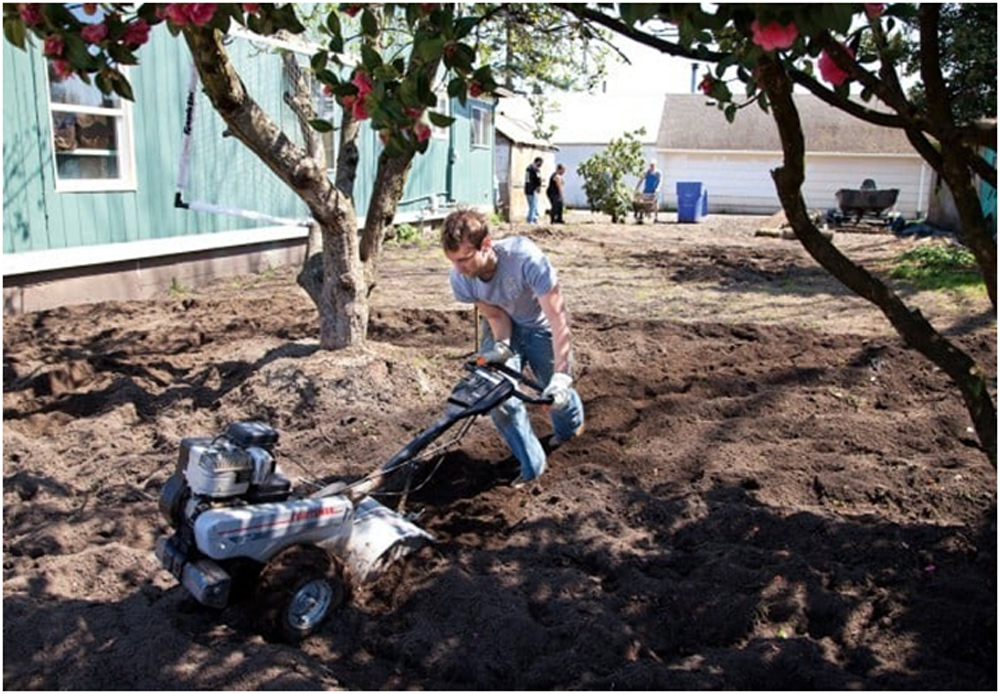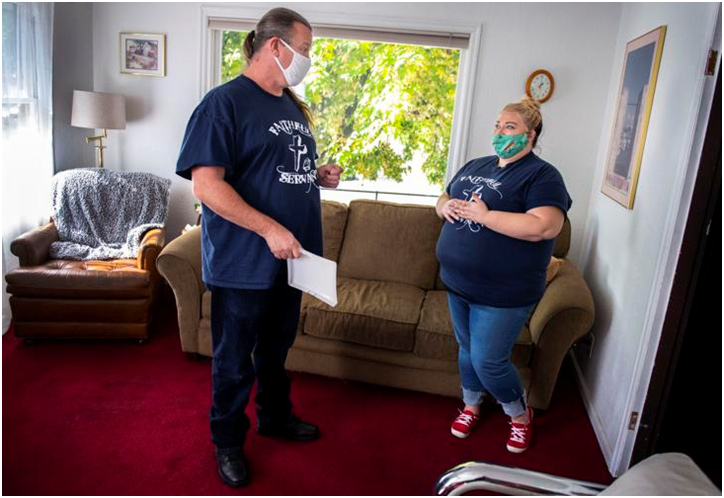Daily News - Oct 30, 2020
Faithful Servants Ministry

Re-purposed drug house helps addicts turn their lives around
Residents share in their required early-morning Bible study and devotional time earlier this month at the Faithful Servants Transitional House in Kelso.
It's 6:45 a.m. on Wednesday, and 13 recovering addicts are sitting inside a Kelso living room clutching Bibles, sipping coffee and thinking about salvation.
Some used to visit the house in its previous, derelict incarnation, when there were holes in the ceiling, trash in the corners and shady characters coming and going. Then it was a place to shoot up or crash — or both, they say. The city ended up condemning it after water and electricity were cut off.
In their previous lives these men wouldn't have been awake at this hour — and if they had, they certainly wouldn't have been studying scripture. Yet now they agree to morning Bible sessions as part of living in the home, which boasts new floors, freshly painted walls and comfortable rooms. They also must attend twice weekly sessions of a Christian-based ministry called Celebrate Recovery. And they must pledge to remain clean and sober or be out the door within 15 minutes.
The house has been sheltering recovering addicts for four months and organizers say they couldn't be more pleased.
"There's miracles happening here every day," said Glen Sensenbach, an addict in recovery who runs the day-to-day operations at the Faithful Servant Transitional House, 710 S. Pacific Ave. "It's amazing."
"(The house) has gone through a ground-up restoration, and that's our hope for the men there too," said Doug Perry, a recovering addict who leads the Celebrate Recovery program at Columbia Heights Assembly of God church. "Starting with the foundation of a place to live and then working through the 12 steps (of recovery) and the eight principles of Celebrate Recovery to keep them on solid ground. ... Jesus Christ is saving lives through this ministry."
'Heaven-sent'
The men range in age from 20s to 60s and have two things in common: They're recovering addicts and they've found solace and strength in religion.
"This is Heaven-sent for me," Earl Mathews, 43, said of the house he's called home for a month and a half. "I had nothing. I don't know what I'd be doing without it."
"I'd like to say I'd keep sober without this house, but there's really not a great chance of that on the street," added Bobby Story, who has lived there two months and was homeless before coming to Faithful Servant.
Each weekday morning begins with the men and Sensenbach's fiancee, Amber Jensen, also a recovering addict, gathering in the main living room reading their Bibles. Each member shares a verse they found particularly relevant that day, such as:
"No temptation has overtaken you that is not common to man. God is faithful, and he will not let you be tempted beyond your ability, but with the temptation he will also provide the way of escape, that you may be able to endure it." - 1 Corinthians 10:13.
Next, it's time for assigned chores. Most daily chores must be completed by 10 a.m. Miss one, and a resident has to copy out a Bible verse 10 times. Miss chores five times and he's out of the house.
"It's about being loyal to God and showing that through work," said James Robinson, who is in charge of checking the chore list and assigning verses if necessary. "I usually pick (a verse) that talks about work. ... And I had to do verses myself yesterday."
From 9 a.m. to 4 p.m. the house is a quiet zone, with no television or computer surfing allowed. Men in college can use the space to study. Others must be out looking for work or volunteering. The residents also are available for volunteer work around town. (Call 353-3521 for details.)
Each Wednesday and Friday the men also must attend the Celebrate Recovery sessions. Sunday they must attend services at a church of their choosing. Meals also are taken together as a family.
"These are my brothers and sisters in Christ," Jensen explains when asked if the house ever feels too crowded. "I love all of them."
The structure is good for recovering addicts, Sensenbach said, because it gives them boundaries and helps them to learn or re-learn how to live normal lives. That's exactly what the Cowlitz County Drug Court program did for him, he said. He and one other house member are in Drug Court.
"When I first came out of addiction I didn't know how to take care of myself at all," he said. "I'd been using so long I didn't know no other way of life."
Some men stay a month or two, others likely will be there close to year, Sensenbach said. It's full now with 10 residents and has a waiting list of about 30 more, however those who don't live in the house can attend meetings.
"They seem to have a very supportive environment and set standards and hold people accountable, which is a good model that they might have picked up from Drug Court," said Superior Court Judge Michael Evans, who has visited the house and knows some of the residents from court. "I'm impressed and pleased and very hopeful."
The house is owned by Cordell Stone, a retired general contractor who bought the circa-1915 building about a year ago to add to other rental properties. He was fixing it up — basically gutting it —when Sensenbach approached with his plan.
"It just sounded like a good plan. ... I just had a good feeling that this might help somebody," Stone said. He agreed to keep the rent to $1,000 a month and said his only requirements are that the men keep the yard nice and not cause problems with the neighbors.
Suzanna Hall, who has lived next door since December, said the men in the house have been friendly when she sees them. Sharon DeGandi, who is moving in on the other side, says they've already helped her clear the lot and remove ivy from her fence. Neither woman said they had any concerns about having recovering addicts living next door.

Doug Perry, center in the black shirt, shares a laugh with residents at the Faithful Servants Transitional House last week during one of the group dinners designed to foster a family-like setting. Perry advises and helped set up the house.
Perry, Sensenbach's Celebrate Recovery sponsor, initially worried the house might be too much for Sensenbach to take on less than two years into his own recovery. The men prayed on it, though, and when Sensenbach found Stone it just seemed like the house was meant to be.
"God just opened up the doors that needed to be opened," Perry said.
Each resident pays $250 a month, which helps cover the rent and day-to-day expenses. Much of the furniture was donated by church members or other supporters and donations of food and other items also help keep the house afloat.
Evans, the judge, said he found it impressive that the home runs without any direct government funds. He also likes that a board of directors, including several members who are not addicts, oversee the house and the non-profit operation. "With that population and past patterns of behaviors, you really need some other members on the board," he said. "It's a good combination."
Most landlords are wary of renting to men with past drug and other criminal convictions. Stone, though, said he was reassured by the strong support of from Columbia Heights Assembly of God. The church group requires background checks and applications to move into the house. Sex offenders are not allowed and residents must agree to random drug tests. If they fail a drug test they have 15 minutes to leave the house. "This isn't just a flop house," Perry said.
So far, no one has failed a drug test, but a couple men left without being tested after they started using again, Perry said. They try to work with the men on just about any other violation, but it's not fair to the others to allow someone using drugs to stay, he said.

Warren Peterson wrestles a rototiller through the yard as a resident work crew prepares the yard for leveling and planting at Faithful Servant Transitional House in Kelso. Residents also have daily chores they’re required to do as part of their contribution to the group living.
The men moved in this January and Stone said he hasn't had any problems or complaints.
"I feel we've got a good supporter from up above - way up above," Stone said.
The two-story, seven-bedroom house is large enough to qualify for 10 residents under city codes, though Sensenbach said he'd like to put more men in there if he could. City officials are working with him to change the house's zoning to the multi-family housing designation needed for long-term use.
Eventually, Sensenbach would like to open another house for men and one exclusively for women. There are so many addicts who want to get clean but either don't know how or can't when they're homeless or living in unsafe conditions, he said.
"It's easy to stay dirty and so hard to get right," he said recently in the Faithful Servant kitchen as fellow residents did chores or made breakfast.
Sensenbach would know.
Twenty-eight years of drug use cost him time in jail, relationships with his family and his self-respect. He was known on the street as someone you didn't mess with. Perry said back when they were both using, he'd cross the street to avoid Sensenbach.
"He used to be one bad dude," agrees Judge Evans, who said he's been amazed at the "dramatic change," in Sensenbach.
Sensenbach, 40, said his whole world turned around once he started attending Celebrate Recovery and felt the acceptance of the church members.
He's studying to be a chemical dependency counselor and planning his wedding to Jensen, Neither of those things would have happened without first turning his life over to God, Sensenbach said. So it just makes sense, he said, to try and help others facing the same challenges.




